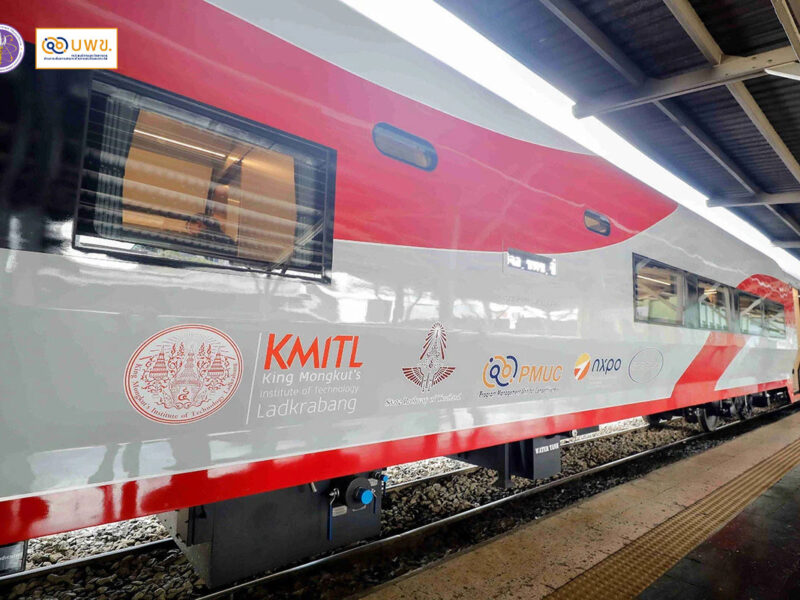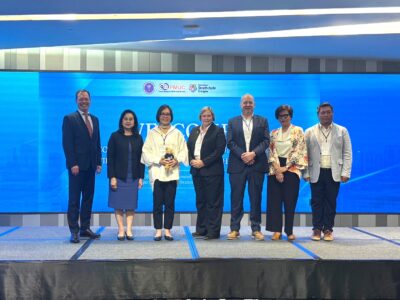
Program Management Unit for Competitiveness (PMUC), in collaboration with the Food Innovation and Regulation Network (FIRN) under the Food Science and Technology Association of Thailand (FoSTAT), organized the event “Functional Ingredients R&D Matching from the Ground Up.” This event provided a platform for knowledge and experience exchange, connecting researchers, food industry entrepreneurs, and funding units to work together comprehensively.
The current trend of consuming food for health benefits continues to rise, expanding the market for Functional Food products and Functional Ingredients, which are valued at over 181 billion US dollars. More than 50% of this market is in the Asia-Pacific region. Factors contributing to this growth include the Wellness Economy, an aging population, and increased global food demand, leading many businesses to focus on entering the Functional Foods market. Functional Foods are those that have been enhanced to provide health benefits beyond their nutritional properties, helping to improve bodily functions or reduce the risk of diseases.
In Thailand, there is a policy to promote food products with Function Claims (FFC) systematically, and PMUC plays a significant role in developing the FFC system in Thailand. This system helps with the health claim registration of food and key ingredients, facilitating the development and expansion of the market for Thai functional food products. The emphasis is on research and development of Functional Foods to create more efficient products, with a primary focus on product safety.
Additionally, PMUC has provided support for infrastructure by establishing 9 pilot plants located at universities nationwide, which serve the private sector in testing and scaling up the production of high-value food products for the industry. PMUC collaborates with various sectors, including FoSTAT and the Food and Drug Administration (FDA), to promote research, development, and certification of Certificate of Analysis for critical quantities and other characteristics according to industry standards, strengthening the potential of producing Functional Ingredients from Thai raw materials.
Furthermore, there is an effort to foster collaboration between academia and industry for market positioning and the development of health-oriented products in conjunction with relevant networks. This collaborative approach aims to empower entrepreneurs to compete in the global market by producing Functional Products.
On August 31, 2023, the Program Management Unit for Competitiveness (PMUC) collaborated with the Food Ingredients Research and Innovation Network (FIRN) to organize the event “Functional Ingredients R&D Matching from the Ground Up”. The purpose of this event was to promote the advancement of Thailand’s capabilities in producing raw materials for functional foods and to provide a platform for matching opportunities for entrepreneurs, researchers, and investors with plans to develop functional ingredients. The event facilitated the exchange of experiences and the establishment of collaborative networks for advancing research into the functional foods business. The event took place at the Jamjuree Ballroom of the Pathumwan Princess Hotel, Bangkok, with Assoc. Prof. Dr. Thongchai Suwansichon, Director of the PMUC, serving as the opening ceremony chairman.

Dr. Thongchai Suwansichon, Director of the PMUC, stated that the key mission of the PMUC is to enhance the competitiveness of Thai entrepreneurs. The department recognized the opportunities to drive the development of the high-value agriculture and food business in the country, particularly in the field of functional ingredients and functional foods. This would empower researchers and business owners at all levels – from the grassroots to the middle and upper tiers – to compete internationally. It would also serve as a turning point for the nation to address the sustainability of public health and create the highest possible benefits, building a high-value product business throughout the value chain. This would enable the use of domestic functional ingredients and international competition, leading to increased income for farmers and the health product industry, including food-based tourism and other health-related businesses in Thailand.
Previously, the PMUC has supported funding for the development of an environmental system that encompasses both infrastructure and the value chain for ingredients and functional aspects. The department has also supported the establishment of pilot plant infrastructure, ready for private sector usage, to conduct tests and scale up production to an industrial level. This initiative is aimed at enhancing the capabilities of entrepreneurs and elevating the competitive edge of the Thai food industry in the global market.

Prof. Dr. Pawinee Chinachote, an advisor to FoSTAT and the spearhead of the FIRN project, talks about the factors and systems leading to the success (Ecosystem) of functional product businesses in Thailand. He mentions that Functional Foods and Functional Ingredients businesses are of great interest and have high growth potential in Thailand. While Functional Foods in Thailand have seen good growth, the growth of the Functional Ingredients business remains stagnant. To encourage the growth of the Functional Ingredients business in Thailand, there’s a need to align it with the BCG model. This includes utilizing all aspects of Functional Ingredients to benefit the upstream operators, increasing their income and quality of life. To develop health-related products, including Functional Ingredients, Functional Foods, Nutraceuticals, and cosmetics, it is essential to standardize raw materials, apply technology and innovation to enhance the production capacity of raw materials throughout the supply chain, such as cultivation, basic processing, extraction, and shelf-life control. Additionally, developing the Functional Ingredients business that benefits the grassroots is crucial. SMEs, farmers, and communities throughout the supply chain should be able to participate in the Functional Foods business to distribute income from high-value food businesses down to the upstream producers. Furthermore, it’s important to develop the entire food system that connects agricultural areas to various product outcomes, creating a paradigm shift for Thailand. This can be achieved through new dimensions of research and development in high-value agricultural food production, enabling new-generation farmers to conduct their businesses in their communities and regions without having to migrate to the city, reducing the number of workers in the food production industry, with currently level at 40% and decreasing, causing instability in Thailand’s food system. Therefore, to make Thailand’s high-value food production ecosystem stable, the business of being a supplier of raw materials in Thailand, at the district or provincial level, must grow. This is so that large corporations can purchase these raw materials. This is a crucial step to stabilize the ecosystem of high-value food production in Thailand.

Mr. Jirasak Kamsuri, the manager of the Industry Research and Strategy Department of the Food Institute, analyzed the trends in the Functional Ingredients industry in Thailand from the perspective of global investment. Currently, the global Functional Ingredients industry is expanding, especially in the Biotechnology sector. However, Thailand’s industry lags behind due to the high cost of production, making it challenging to compete with imported products, particularly from China and India, which are major players in the global market for Functional Ingredients. Another obstacle is the lack of international standards for Thai raw materials, resulting in inconsistent quality. Mr. Jirasak suggests driving the Thai Functional Ingredients industry through increased research and development to improve the quality of raw materials, enhance the capacity of herbal extraction facilities, develop and upgrade infrastructure for testing and experimentation, and simplify the registration process. The state should also implement measures to attract organic investment, support technical service providers, attract talent, and support the growth of businesses through inorganic growth.

Within the event, there have been discussions about strategies to elevate innovation and the Functional Ingredients business in order to produce health-oriented and functional products in Thailand. The discussion was led by Wiwan Chompeuch, B.Sc.(Pharm.), an expert in the product registration group of the Herbal Products Division at the Food and Drug Administration Office, Dr. Channarong Techaangkoon, B.Sc.(Pharm.), Chairman of the Biotechnology Industry Group, Federation of Thai Industries, and Dr. Kasidet Teeranitaya, DVM., CEO and Co-founder of Morena Solutions, Co.Ltd. The conversation revolved around the trends of Functional Products and Functional Ingredients in Thailand and the global market. Functional Ingredients, especially probiotics, are in high demand, accounting for 28% of the market. Popular Functional Products include bakery and cereal products, making up 28% of the market, followed by dairy products at 27%. These trends reflect the urban lifestyle’s demand for convenient and nutritious food. Additionally, there were discussions about regulations and requirements for successful production of herbal products and food to enable participants to understand the process of applying for health claims through the Food and Drug Administration and promoting an environmentally friendly system to develop Functional Ingredients. There were also recommendations for collaboration and the exchange of research ideas, product development, production technology, innovation, and market for health food products among participants, to promote SME entrepreneurs to align with the guidelines and increase the capabilities of Thai entrepreneurs throughout the supply chain.


In the later segment of the event, there was a special presentation on expanding food production functions and managing it with suitable technology. It was conducted by Dr. Thanet Laorhob, a professor at Naresuan University and a consultant for the research and development department of Greater Pharma, Co.Ltd. This presentation aimed to provide guidance for use in research or analysis of Functional Food and Functional Ingredients, with the goal of advancing research into commercial applications. Additionally, an event titled “Star Search – R&D Matching for Success” took place, in which researchers were allowed to present their work and engage in discussions to exchange knowledge and experiences with interested individuals in the Functional Food and Functional Ingredients business. The objective was to develop networks and foster collaboration between researchers and entrepreneurs to utilize research findings for commercial purposes.
The business of Functional Foods and Functional Ingredients is considered vital in Thailand. It not only creates new market shares but also increases income for upstream producers, such as farmers and food processing facilities, who have raw materials on hand (e.g., mangosteen or pineapple peels, fish essence, rice bran). It also benefits Functional Ingredients producers, whether they are established businesses, start-ups, or international companies with technology and interest in partnering with Thai companies. These opportunities offer avenues for business expansion that may have been hindered by academic or regulatory obstacles that are typically time-consuming in terms of research and innovation for licensing both domestically and internationally. The Thailand Board of Investment (BOI) has supported the development of FFC Thailand to boost the value of Thai agricultural and food products, particularly Functional Ingredients and Functional Foods, to meet global quality standards. This has been achieved through collaboration with relevant agencies at all levels, including FoSTAT, universities, and government departments. The aim is to create a network for research, development, and the emergence of new entrepreneurs, businesses, and industries, making the food industry a revenue-generating sector for the country while enhancing the skills and competencies of its workforce to compete globally.










